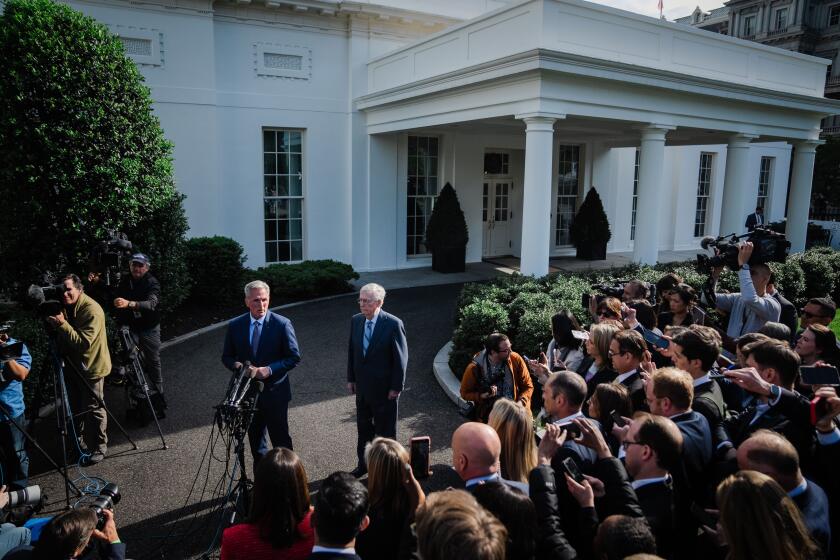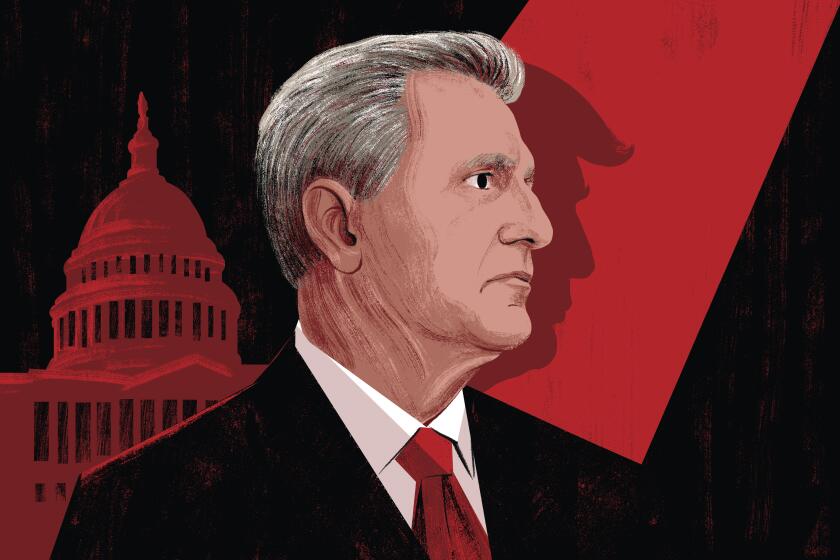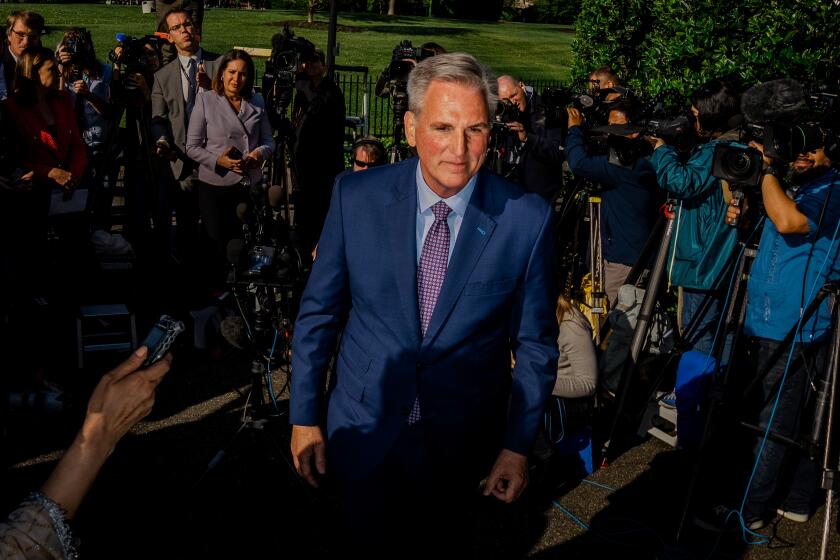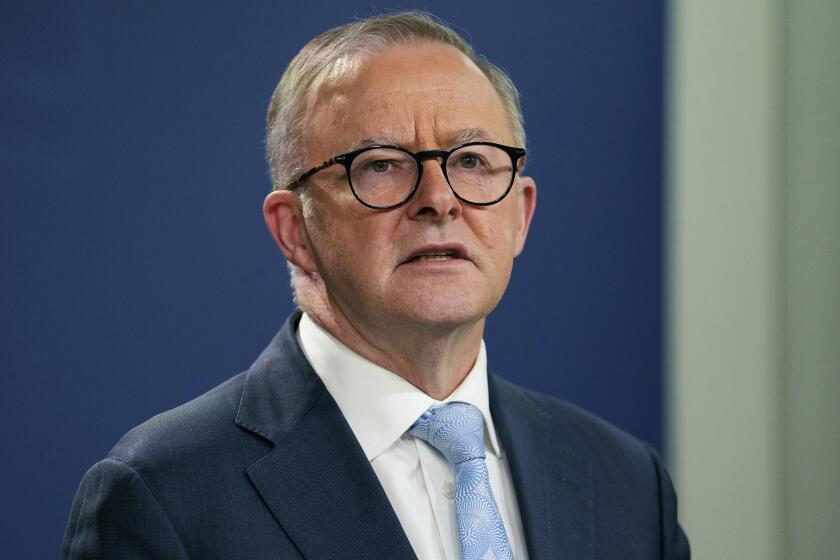Threat of U.S. debt default upends Biden’s trip to the Pacific
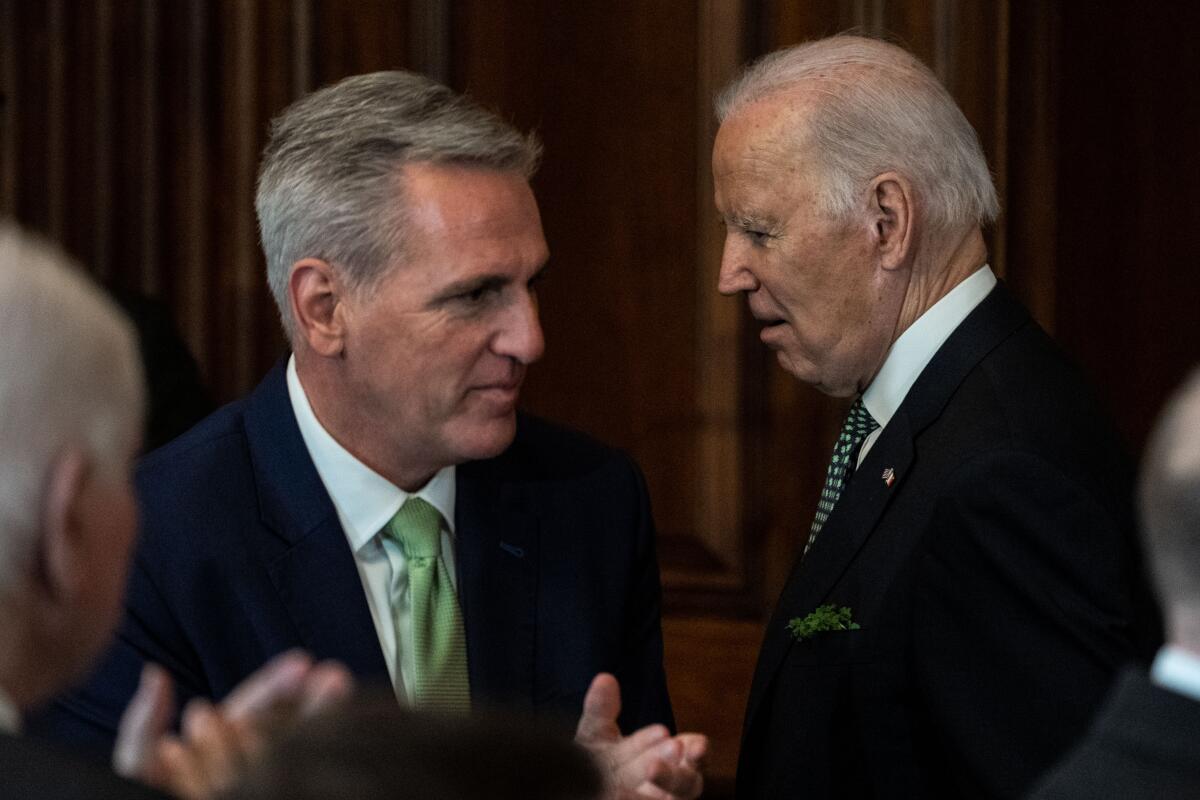
- Share via
WASHINGTON — President Biden will arrive at the Group of 7 summit in Hiroshima, Japan, on Thursday with a substantial to-do list: Reassure Western allies of U.S. commitments in the Indo-Pacific region while calling for economic unity against China and Russia.
But political dysfunction at home was undermining Biden’s foreign policy agenda even before Air Force One took off from the U.S. on Wednesday morning. On Tuesday he scrapped plans to visit Papua New Guinea and Australia next week, and will instead return to Washington this weekend for ongoing debt limit negotiations with congressional Republicans.
Biden scrubbed the last leg of the trip after talkswith House Speaker Kevin McCarthy and other congressional leaders failed to yield a deal to raise the government’s debt ceiling and avoid a default that could roil markets, choke off the flow of capital and trigger a global financial crisis. The Treasury Department has warned that the government could run out of cash for the first time as soon as June 1.
“The entire credibility of this country ... our leadership in every capacity would be affected by a default,” warned Chuck Hagel, a former Republican senator from Nebraska who was Defense secretary under President Obama. “Especially at a time when China is challenging America as the preeminent power in the world.”
An eleventh-hour deal saved the U.S. from defaulting on its debts in 2011. The brakes aren’t as reliable this time.
House Republicans have refused to raise the debt limit — a once perfunctory practice that has devolved into a political fight in recent years — unless the White House agrees to budget cuts. Biden has been firm that the two issues are separate. He has said he is happy to negotiate on budget cuts going forward, but has insisted that it is Congress’ responsibility to allow the government to continue borrowing to pay for bills it has accrued.
Biden projected optimism before leaving for Japan on Wednesday morning.
“I’m confident that we’ll get the agreement on the budget and America will not default,” he said from the Roosevelt Room of the White House. “It would be catastrophic for the American economy and the American people if we didn’t pay our bills.”
White House and Republican congressional staff members plan to continue negotiations while Biden is abroad, but the outcome will be closely watched in Hiroshima, where the world’s most advanced economies are trying to assess the likelihood of a U.S. default.
The president plans to use the annual global meeting to announce new restrictions on U.S. investment in China in advanced technology industries including semiconductors, quantum computing and artificial intelligence. He wants allies to impose similar measures.
The U.S. and other G-7 nations — Britain, Canada, France, Germany, Japan and Italy — are also considering ways to escalate economic pressure on Russia in response to its ongoing assault on Ukraine. A total ban on exports to Russia is on the table.
That’s all a hard sell when the U.S. is teetering on the brink of a default, according to Josh Lipsky, senior director of the GeoEconomics Center at the Atlantic Council think tank.
“This just puts so much tension where the U.S. is trying to push these G-7 allies to do more than they’ve done before on Russia and China,” he said. “But this huge issue is weighing on everyone’s mind.”
McCarthy (R-Bakersfield) said the two sides remain miles apart but told reporters after meeting with Biden on Tuesday that it was possible to reach a deal by the week’s end. Though Biden has insisted he is not negotiating the debt limit, his shortened trip signals progress in the months-long stalemate. The two sides appear to have reached tentative agreements on several issues, including returning unspent COVID-19 funds and passing permitting reform to speed up energy development.
The Bakersfield congressman’s ideological flexibility, fundraising prowess and management of Donald Trump have helped him hold House Republicans together as they head into the midterm elections. Now he’s on the verge of gaining the prize he has long desired.
White House officials said they were confident that the fiscal showdown wouldn’t rattle G-7 allies or undermine the president’s mission to deepen ties in the Pacific region — part of a broader U.S. effort to counter China’s more aggressive economic and military actions.
G-7 leaders “know that our ability to pay our debts is a key part of U.S. credibility and leadership around the world,” National Security Council spokesman John F. Kirby told reporters Tuesday. “They understand that the president also has to focus on making sure that we don’t default and on having these conversations with congressional leaders.”
Kirby pointed out that Biden is to meet with leaders of the Quadrilateral Security Dialogue — known as the Quad alliance — on the sidelines of the G-7 summit. The group, which consists of the U.S., India, Japan and Australia, was due to appear at Sydney’s harbor-side Opera House on May 24. Although Biden canceled his appearance at the Quad meeting, he has invited Australian Prime Minister Anthony Albanese to the White House for an official state visit to be determined at a later date.
House Speaker Kevin McCarthy reported no progress after negotiating at the White House with President Biden over an increase in the debt limit to pay the nation’s bills.
Previous U.S. presidents have scrapped foreign travel to deal with domestic fiscal fights. Obama was forced to cancel a 2013 trip to Indonesia and Brunei over a potential government shutdown, and President Clinton skipped the Asia-Pacific Economic Cooperation forum in Japan in 1995 to address a budget standoff.
But “the world is far more upside down and volatile and uncertain now,” Hagel said. Russia’s full-scale invasion of Ukraine has shifted the world order, while brewing tensions with China over Taiwan have raised the specter of war in the South China Sea and left the region on edge.
Though it’s unclear what exactly would happen if the U.S. were to default on its debt, given that it’s never done so, the economic fallout could erode confidence and reduce other countries’ reliance on the dollar, according to Lipsky.
The U.S. dollar is the world’s most widely circulated currency, accounting for nearly 60% of global central bank reserves, according to the International Monetary Fund. A drop in the value of the dollar could prompt countries to stop trusting the banknote, ending its reign as the world’s reserve currency.
Any default would amount to a “giant self-inflicted wound” and undermine the United States’ international position, said Jonathan Kirshner, a political science and international studies professor at Boston College.
“If the United States voluntarily and unnecessarily defaults on its sovereign debt, that will be a very important data point for countries making assessments about their expectations about U.S. behavior ... about its reliability, about whether it is governed by adults in the room who are capable of advancing America’s interests,” Kirshner said.
Biden’s decision to skip the second leg of his trip will not go unnoticed in Beijing, where Chinese President Xi Jinping has amplified doubts about America’s reliability and pitched China’s authoritarian system as an alternative to Western democracy.
Xi, who doesn’t have opposition parties to worry about, is the most powerful Chinese leader in decades and could hold on to his post for life. Biden, who must face a reelection challenge next year, can’t promise that kind of continuity.
“What it says to our competitors and adversaries around the world is: This is just more proof the United States is a country that’s in decline,” Hagel said.
The president had been scheduled to stop in Papua New Guinea, where he planned to spend a few hours with Pacific Island leaders as the U.S. continues to jostle with China for influence across the Pacific. Biden, who would have become the first sitting U.S. president to visit the country, hosted Pacific Island leaders at the White House last year.
After President Biden canceled plans to visit, Australia’s prime minister has ruled out a so-called Quad summit that was to take place in Sydney.
His now-canceled visit to Australia would have been his first as president and the fourth meeting among Quad leaders since he took office.
“The nature of the presidency is addressing many of the critical matters all at once, so I’m confident we’re going to continue to make progress toward avoiding default and fulfilling America’s responsibility as a leader on the world stage,” Biden said at a celebration of Jewish American Heritage Month at the White House after meeting with McCarthy on Tuesday.
The alternative would devastate the economy, he warned, “and our international reputation would be damaged in the extreme if we were to let that happen.”
More to Read
Get the L.A. Times Politics newsletter
Deeply reported insights into legislation, politics and policy from Sacramento, Washington and beyond. In your inbox twice per week.
You may occasionally receive promotional content from the Los Angeles Times.
